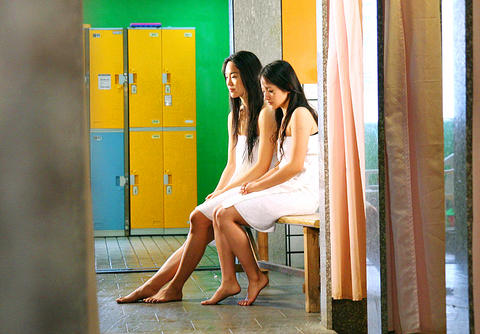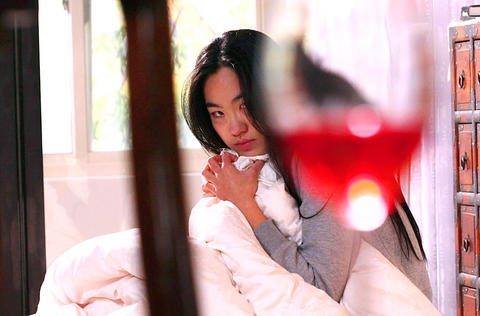Rife with controversy, I Saw a Beast (我看見獸) is expected to generate bitterness and anger. Based on a true story and directed by Christian television director Liu I-hung (劉議鴻), it hits a raw nerve in both the homosexual and Christian communities.
The film purports to be a sermon on homosexuality, which it portrays as a sin that will only find forgiveness in the love of God, which, according to the movie, is the answer for all sinners, regardless of sexual orientation.
In I Saw a Beast, Jane, a Christian lesbian radio show hostess struggles to reconcile her faith and sexuality. She stops going to the church when church members judge her. She comes out believing that this will provide freedom, but ends up feeling trapped in a tormenting relationship with Patty, a married woman with a wealthy husband and a son.

PHOTO: COURTESY OF TAI HUNG CO
As her sense of anguish and guilt mount, Jane is petrified by a vision she has at a T-bar, in which debauched lesbians are possessed by a licentious beast. With help from sisters Lin and Chen, Jane returns to the embrace of God.
Meanwhile, Patty decides to confront her husband and leave her secure home to be with Jane, the love of her life. Little does she know that Jane's newly found faith would push her into despair, leading to a spiral of revenge and destruction.
Cinematically speaking, the film can be described as mediocre at best. What intrigues and repels is its blunt exposition of the Christian view of homosexuality told through a true story. To homosexuals and liberals, it's a tough work to digest. But the film's merits lie in its close look at a struggling believer and the chance she has to face up to opposition to her sexuality. The film promotes rational conversation, which may lead to mutual understanding and respect.

PHOTO: COURTESY OF TAI HUNG CO

By 1971, heroin and opium use among US troops fighting in Vietnam had reached epidemic proportions, with 42 percent of American servicemen saying they’d tried opioids at least once and around 20 percent claiming some level of addiction, according to the US Department of Defense. Though heroin use by US troops has been little discussed in the context of Taiwan, these and other drugs — produced in part by rogue Chinese Nationalist Party (KMT) armies then in Thailand and Myanmar — also spread to US military bases on the island, where soldiers were often stoned or high. American military policeman

Under pressure, President William Lai (賴清德) has enacted his first cabinet reshuffle. Whether it will be enough to staunch the bleeding remains to be seen. Cabinet members in the Executive Yuan almost always end up as sacrificial lambs, especially those appointed early in a president’s term. When presidents are under pressure, the cabinet is reshuffled. This is not unique to any party or president; this is the custom. This is the case in many democracies, especially parliamentary ones. In Taiwan, constitutionally the president presides over the heads of the five branches of government, each of which is confusingly translated as “president”

An attempt to promote friendship between Japan and countries in Africa has transformed into a xenophobic row about migration after inaccurate media reports suggested the scheme would lead to a “flood of immigrants.” The controversy erupted after the Japan International Cooperation Agency, or JICA, said this month it had designated four Japanese cities as “Africa hometowns” for partner countries in Africa: Mozambique, Nigeria, Ghana and Tanzania. The program, announced at the end of an international conference on African development in Yokohama, will involve personnel exchanges and events to foster closer ties between the four regional Japanese cities — Imabari, Kisarazu, Sanjo and

Sept. 1 to Sept. 7 In 1899, Kozaburo Hirai became the first documented Japanese to wed a Taiwanese under colonial rule. The soldier was partly motivated by the government’s policy of assimilating the Taiwanese population through intermarriage. While his friends and family disapproved and even mocked him, the marriage endured. By 1930, when his story appeared in Tales of Virtuous Deeds in Taiwan, Hirai had settled in his wife’s rural Changhua hometown, farming the land and integrating into local society. Similarly, Aiko Fujii, who married into the prominent Wufeng Lin Family (霧峰林家) in 1927, quickly learned Hoklo (commonly known as Taiwanese) and